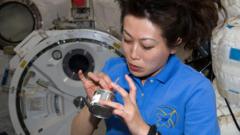A pioneering experiment recently launched by the European Space Agency (ESA) into orbit is set to explore the feasibility of growing lab-grown food for astronauts. The mission aims to assess how the unique conditions of space—including low gravity and increased radiation—affect the growth of food products from individual cells, a process that could be revolutionary for future space missions.
ESA's initiative seeks to tackle the staggering cost of feeding astronauts, which can reach as high as £20,000 per day. Leading the project is Dr. Aqeel Shamsul, CEO of Frontier Space, who envisions a future where food production plants exist on the International Space Station (ISS) and other celestial bodies. "Our goal is to establish manufacturing facilities off-world, essential for human habitation in space," he explained.
The lab-grown food process entails cultivating essential food components like proteins and carbohydrates in a controlled environment, thereby enabling a more diverse and palatable diet compared to traditional freeze-dried meals. With lab-grown products already available on Earth, the focus now shifts to understanding how these processes can be adapted for the harsh conditions of outer space.
As part of the ESA project, a small bioreactor has been sent into orbit aboard a reusable spacecraft, where it will eventually return to Earth for analysis. This pioneering research will inform the development of a larger, more sophisticated bioreactor intended for future missions, aimed at advancing the science of space food production.
Experts believe that the ability to grow food in space could alleviate significant logistical challenges associated with long-term missions on the Moon or Mars, where resupplying food would be tremendously costly and impractical. The bioreactor experiment is critical to test the hypothesis that food can be safely cultivated and consumed in weightlessness.
To complement this scientific endeavor, a culinary education designer at Imperial College, Jakub Radzikowski, is working on creating appealing dishes using current safe ingredients. His mission: to simulate comforting meals for astronauts from diverse cultural backgrounds and enhance the dining experience in space.
The importance of a varied diet is underscored by Helen Sharman, the first British astronaut, who highlights the psychological and physiological benefits of enjoyable meals during long space missions. Research indicates that astronauts often face changes in their biochemical makeup, leading to potential weight loss due to unexciting food options. Lab-grown food could provide customizable nutrition tailored to the unique dietary needs experienced in space, perhaps even incorporating advantageous supplements directly into the food.
The successful outcome of this experiment could not only transform how astronauts eat in space but also mark a significant step toward sustainable off-world living, ensuring food security as humanity ventures further into the cosmos.

















